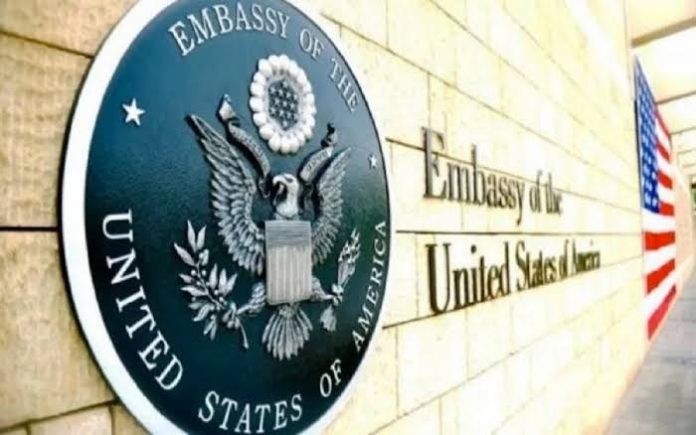The United States Embassy in Abuja has firmly dismissed speculation that its decision to shorten the validity of non-immigrant visas for Nigerians is tied to Nigeria’s recent engagements with the BRICS economic bloc.
In a statement, the Embassy emphasized that the new policy, which limits B1/B2, business/tourist, F, student, and J, exchange visitor, visas to single-entry with a three-month validity, is based on global technical and security standards, not political considerations.
The abrupt change, effective July 8, 2025, marks a significant shift from the previous multi-entry, longer-validity visas, sparking concern among Nigerian diplomats, academics, and business professionals.
“The U.S. Mission Nigeria wishes to address misconceptions about the recent reduction in visa validity for most nonimmigrant U.S. visas in Nigeria and other countries.
“This reduction is not the result of any nation’s stance on third-country deportees, introduction of e-visa policies, or affiliations with groups like BRICS,” the statement said.
It added that “the reduction in validity is part of an ongoing global review of the use of U.S. visas by other countries using technical and security benchmarks to safeguard U.S. immigration systems.
“We value our longstanding partnership with Nigeria and remain committed to working closely with the Nigerian public and government officials to help them meet those criteria and benchmarks, thereby ensuring safe, lawful, and mutually beneficial travel between our nations.
“This decision is neither punitive nor politically motivated. Visa reciprocity is determined by worldwide technical and security benchmarks, not foreign policy alliances.
Washington had earlier cited three key areas requiring improvement: secure travel documents, better management of visa overstays, and enhanced security information sharing.
The U.S. acknowledged Nigeria’s “ongoing efforts” to meet these standards and pledged continued collaboration with Nigerian immigration and security agencies.
Nigeria’s Ministry of Foreign Affairs had earlier expressed concern, calling the restrictions “inconsistent with principles of reciprocity and mutual respect.”
“This policy imposes undue hardship on Nigerian travelers, including students, professionals, and cultural ambassadors. We urge the U.S. to reconsider in the spirit of our strong bilateral relationship,” Ministry spokesperson Kimiebi Imomotimi Ebienfa, said.
The Ministry confirmed that diplomatic talks are underway to restore more favorable visa terms.
Despite the disagreement, both nations reaffirmed their commitment to maintaining robust ties as U.S. stressed its desire to deepen people-to-people exchanges and security cooperation with Nigeria.
Thousands of Nigerian travelers, particularly students and business professionals, could face heightened costs, logistical challenges, and uncertainty in their U.S. engagements unless the U.S. revises its stance or Nigeria accelerates reforms.



